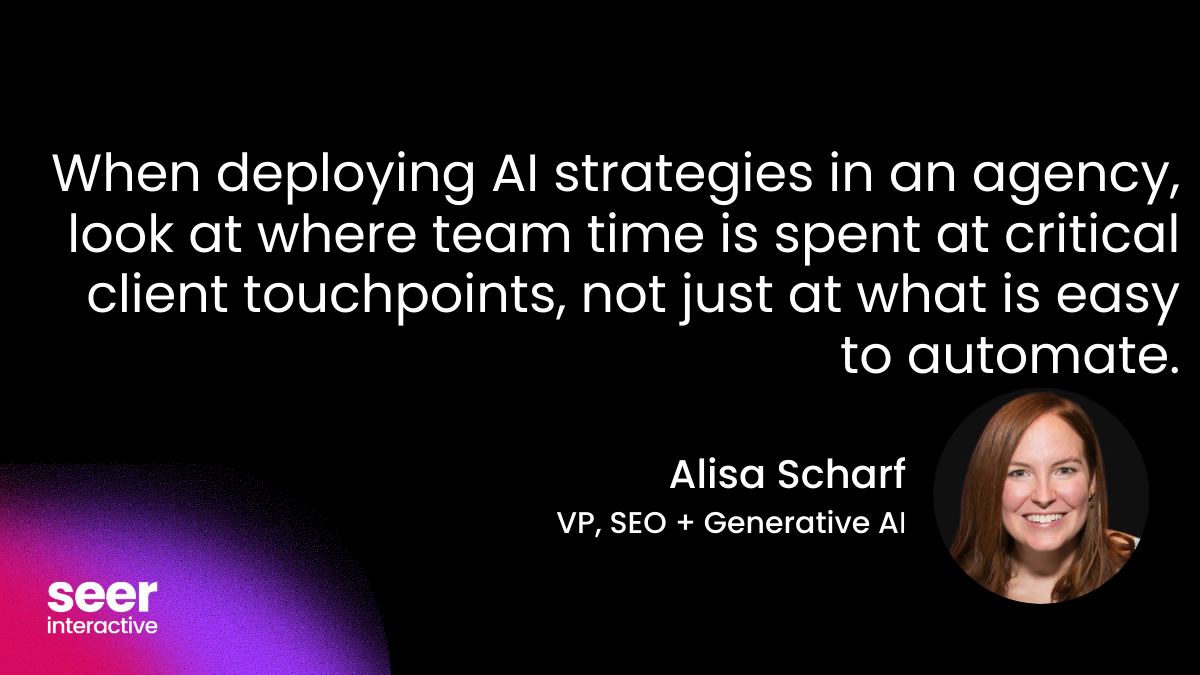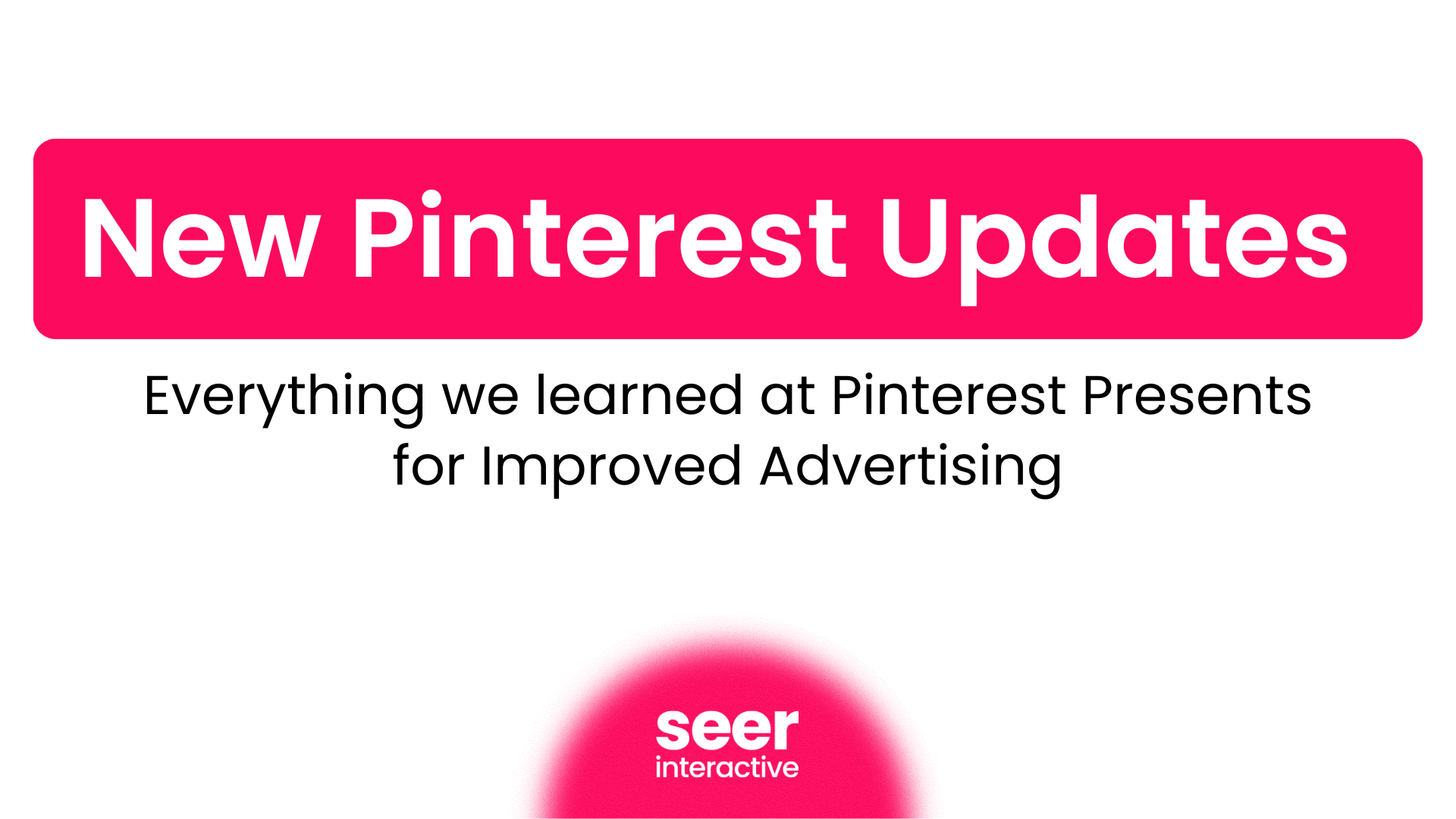Ready, Set, Go!
Over the last 12 weeks, I’ve worked as a digital marketing intern at Seer’s San Diego office. Throughout my experience, I’ve acquired a tremendous amount of new skills, managed several projects, and have built lasting friendships along the way. Having completed the internship, I think that if someone were to ask me, “Tim, what’s it like to intern with Seer?”, I’d tell them it’s what I imagine being a decathlete is like...
![]()
Maybe I’m biased as a recent college grad who competed as a pole vaulter at UCSD; however, upon reflecting on my time spent as an athlete, and my time spent as an intern at Seer, I can’t help but see the inherent similarities. So, if you’re looking to apply for an internship with Seer, or you’ve already landed the gig, and you’re starting to wonder, “What exactly am I getting myself into, what can I expect, and how can I best succeed in my internship?” have no fear, because this awesome analogy is also a knowledge bomb in disguise.
What exactly is a decathlon? It is an event in Track and Field that spans two days, and incorporates 10 events.
The Seer-Cathlon, on the other hand, is an event exclusive to dedicated college students looking to break into the digital marketing world. It spans 12 weeks, includes 3 main events, and requires an insatiable desire to learn and steadfast determination to give it all you’ve got. The 3 main events are: Pay Per Click or Paid Search Marketing, Search Engine Optimization, and Analytics.
Track Events and their Digital Marketing Counterparts
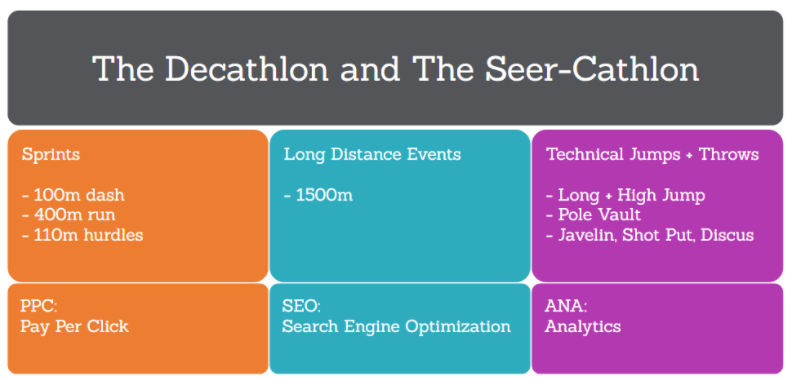
Paid Search Marketing (PPC): Hurdles and Short Sprints
Due to the nature of PPC Marketing, the results are quick. The Keyword Auctions, where you bid on keywords to get your a’s displayed by Google, are like regular auctions except digital and automated. As a Seer-Cathlete these auctions function as your races. In order to succeed in your “races”, it all comes down to the work you put in leading up to competition day.
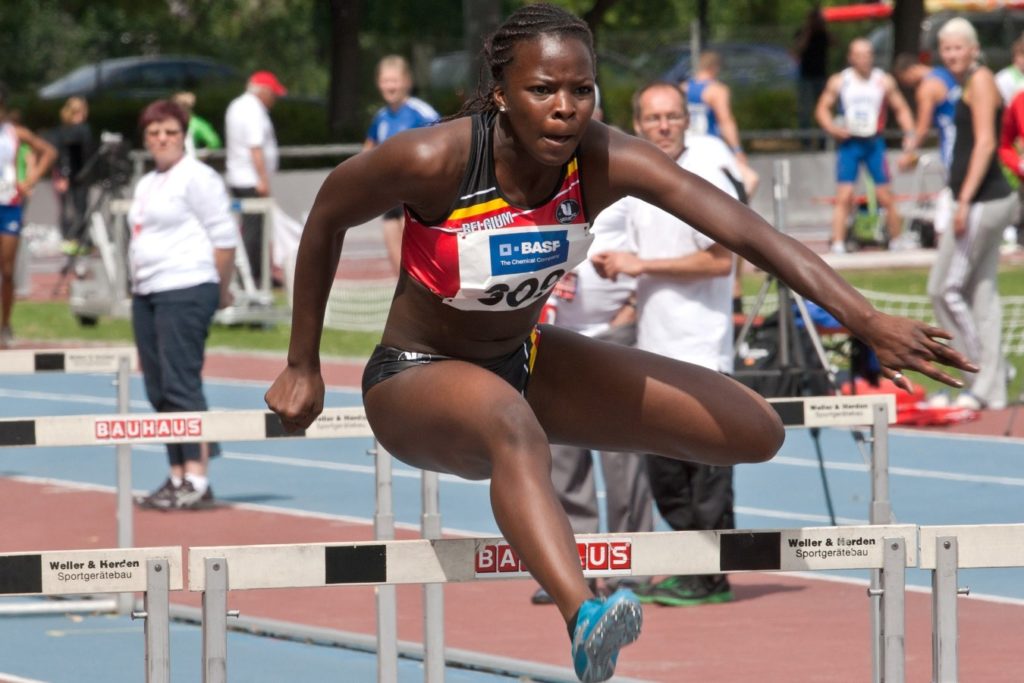
The Seer-cathlete equivalent of good sprint technique, which is invaluable to your success, comes down how well you understand the product or services your client is offering. Achieving success here relies on the search query reports, keyword lists, and negative keyword lists you construct by looking at website traffic and understanding what terms best resonate with your target audience.
There’s also a heavy analytics focus in PPC that parallels the technique imperative for any successful sprinter/hurdler to succeed. It doesn’t matter if you’re running a race or an ad campaign, form and technique are everything. If you’re missing cues during your race or not paying attention to the small details of an ad campaign, you’re at a huge disadvantage. However, if you’re able to fine tune your technique, you can make drastic improvements in your time or conversions.
Search Engine Optimization: The Long-Distance Events
With SEO you’re in it for the long haul. Like long distance events, every practice session or workday you complete is building off what you accomplished the day before.
Building a website is like training for a 10k; there’s no shortcuts, it’s hard work with incremental progress day after day from start to finish. If you’re not putting in quality work from the beginning, you’re going to find yourself struggling later down the line.

Long Distance and SEO are not about instant gratification or good intentions without follow through. It’s about committing to a plan of attack that will pay off in the long haul, and not quitting until you’ve reached said goal. Sure, running 60-plus miles a week or restructuring an entire website may be painful, but in the end it pays off big time.
Analytics: Technical Jumps and Throwing Events
Lastly, you have analytics, also known as the technical events. While technical events still heavily rely on speed, strength, and endurance, the most important part of performing well relies on your understanding of the event. You have to understand your strengths and your weaknesses to be able to fine tune a strategy that gives you the best chance at success.
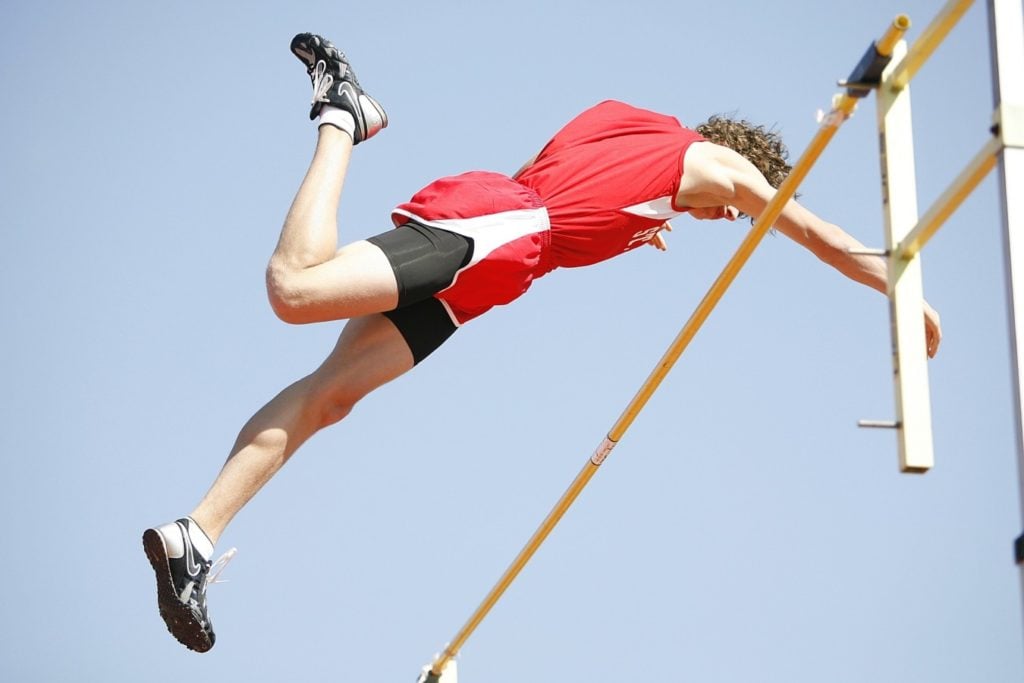
With the technical events, you can have five different coaches look at a jump or throw and come back with several different opinions on how to improve your performance. Analytics is very similar in this regard. It requires you to be able to recognize where you’re succeeding and know what area you need to focus on improving. Sure, you can try to force a win by cutting corners to maximize results in the short run, but if you recognize what areas need improvement, you’ll achieve substantial growth.
The Equipment and Tools of a Seer-Cathlete
Where an elite decathlete has five to seven different pairs of shoes, one to two javelins, three to eight pole vault poles, starting blocks, a shot put, and a discus to use when competing in their multiple throwing, running and jumping events, a Seer-Cathlete has a similar arsenal of digital marketing tools at their disposal.
While running shoes and track spikes are the most essential tools to a decathlete’s daily routine, the Seer-Cathlete’s equivalent would be Microsoft Office, Google Mail, slides, and sheets. Pro-tip: show up to the “track” knowing the basics of how to tie your “shoes and spikes.”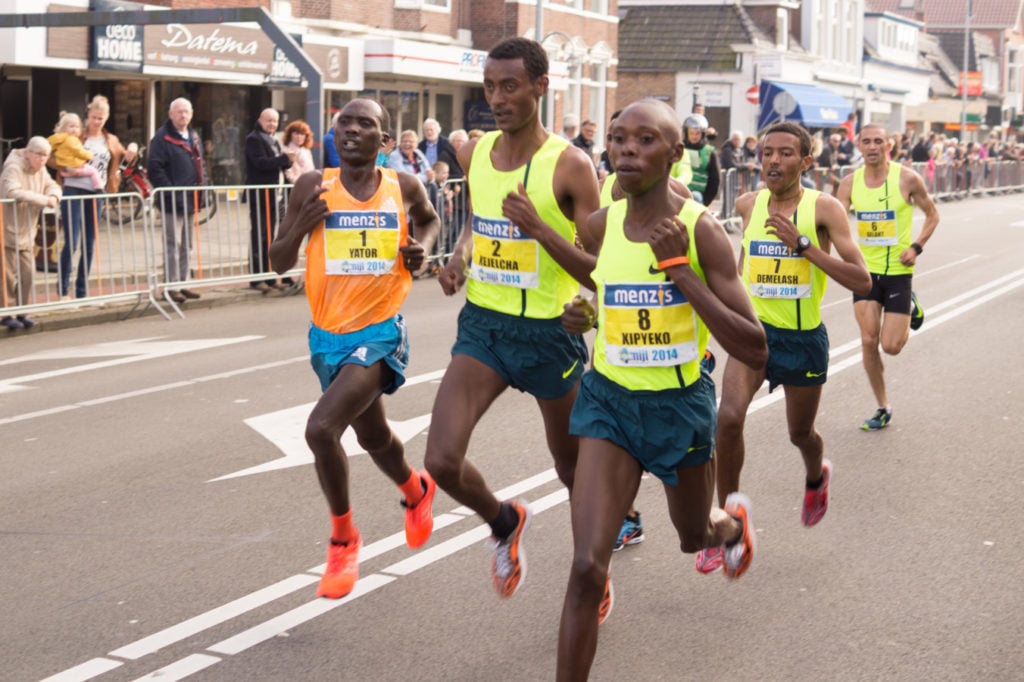
In addition to shoes and spikes, a decathlete is responsible for learning how to properly use the more complicated equipment like the pole vault poles, disci, shot-puts, and javelins. In the digital marketing world, these tools are Google/Bing Analytics, Adwords, Adwords Editor, Power of BI, SEMrush, Keyword Planners, etc.
While many of these tools from both track & field and digital marketing can take years to master, have no fear because you’ll receive instruction from your teammates, who were once beginners just like you!
At Seer, your teammates are the individual event athletes.
Unlike decathletes, their specialties lie in SEO, PPC, and ANA. As specialists they know all the tips and tricks, and they’ll be there to help you learn the basics.
Over the course of your tenure as a Seer-Cathlete, you’ll meet with many specialists from each event department to train and learn under their guidance. In addition, you’ll meet with your head coach, aka your personal mentor, to go over your progress, schedule, and strategy.
One strategy that I personally adopted as a Seer-Cathlete, and to which I attribute much of my success, was to focus heavily on one of the three events from day one. So while I still went to all event trainings and signed onto handle projects in every event, I picked one event that I was the most interested in and dedicated the majority of my time and attention to it.
While this strategy probably wouldn’t work as well for actual decathletes, I found it was key to making the most of my 12 weeks at Seer.
Off Season Training
One of the most crucial components of a decathlete and Seer-Cathlete’s overall success is knowing how to train during the off-season.
As a Seer-Cathlete, your off-season is your Tuesdays and Thursdays. Now, let me preface this by saying nobody expects you to work beyond 20 hours a week for Seer, and nobody is going to sit you down, like your old high school coach used to and tell you that, “Tuesday and Thursday practices are not mandatory, but are ‘highly encouraged’ *wink wink*.” However, given the nature of a great company like Seer, if you invest in them, they’ll invest in you. I can’t emphasize enough how important it is to show that you’re interested and passionate about learning during your 12 weeks with them.
While on your “off-season,” I recommend:
- Reading the Seer blog
- Organizing your schedule
- Handling personal side projects you may have pitched
- Getting your Google Analytics/Adwords Certification
- Going over your notes and unread emails
- Brainstorm about ways you can improve internal processes
- Thinking of insightful questions to ask when meeting with Seer team members
You don’t need to overdo it, but spending a couple extra hours working to make an impact at Seer will pay off in the long run!
The Finish Line
There’s a lot to gain from interning with Seer. You’ll be exposed to a wealth of information, learn new skills., and meet amazing people. If you think you’re up to the challenge of tackling a multi-faceted internship and you’re not afraid to work hard, then I can’t recommend Seer enough. As someone who has had quite a few internships, I’m confident in saying Seer is one-of-a-kind, especially when it comes to team environments. If you have the opportunity to intern at Seer, and you have what it takes, go for it!
![]()
More than anything, don’t be afraid to fail or ask questions. Seer rewards those who take the initiative and risk and is more than happy to support those who need help along the way. Whether you’re a decathlete, a Seer-Cathlete, or someone who just loves reading blogs, do as I do, strive for greatness, learn from your failures, and make the most out of every opportunity that presents itself.
Think you have what it takes to compete in the Seer-Cathalon?
Learn more about our internship program and opportunities today!

